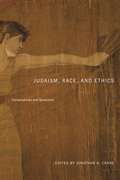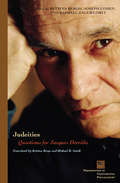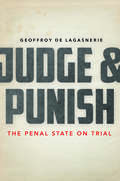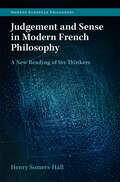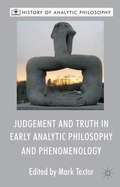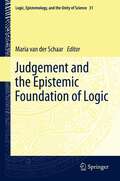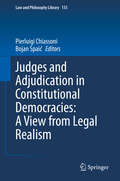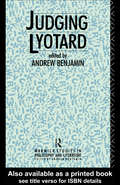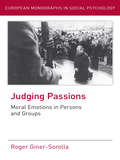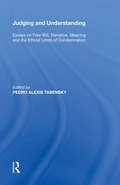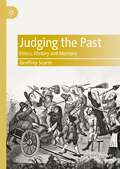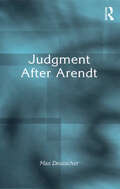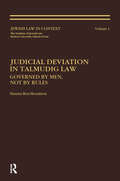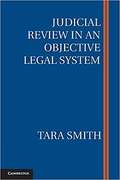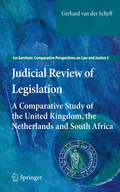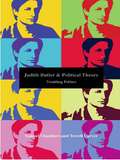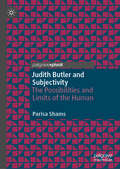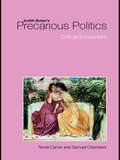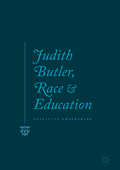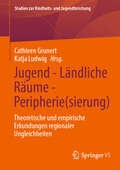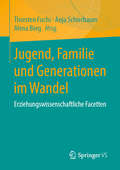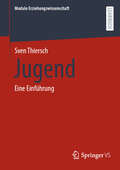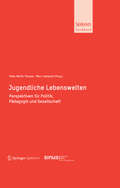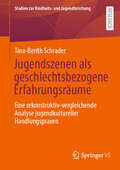- Table View
- List View
Judaism, Race, and Ethics: Conversations and Questions (Dimyonot)
by Jonathan K. CraneRecent political and social developments in the United States reveal a deep misunderstanding of race and religion. From the highest echelons of power to the most obscure corners of society, color and conviction are continually twisted, often deliberately for nefarious reasons, or misconstrued to stymie meaningful conversation. This timely book wrestles with the contentious, dynamic, and ethically complicated relationship between race and religion through the lens of Judaism. Featuring essays by lifelong participants in discussions about race, religion, and society— including Susannah Heschel, Sander L. Gilman, and George Yancy—this vibrant book aims to generate a compelling conversation vitally relevant to both the academy and the community. Starting from the premise that understanding prejudice and oppression requires multifaceted critical reflection and a willingness to acknowledge one’s own bias, the contributors to this volume present surprising arguments that disentangle fictions, factions, and facts. The topics they explore include the role of Jews and Jewish ethics in the civil rights movement, race and the construction of American Jewish identity, rituals of commemoration celebrating Jewish and black American resilience, the “Yiddish gaze” on lynchings of black bodies, and the portrayal of racism as a mental illness from nineteenth-century Vienna to twenty-first-century Charlottesville. Each essay is linked to a classic Jewish source and accompanied by guiding questions that help the reader identify salient themes connecting ancient and contemporary concerns.In addition to the editor, the contributors include Sander L. Gilman, Annalise E. Glauz-Todrank, Aaron S. Gross, Susannah Heschel, Sarah Imhoff, Willa M. Johnson, Judith W. Kay, Jessica Kirzane, Nichole Renée Phillips, and George Yancy.
Judaism, Race, and Ethics: Conversations and Questions (Dimyonot: Jews and the Cultural Imagination #8)
by Jonathan K. CraneRecent political and social developments in the United States reveal a deep misunderstanding of race and religion. From the highest echelons of power to the most obscure corners of society, color and conviction are continually twisted, often deliberately for nefarious reasons, or misconstrued to stymie meaningful conversation. This timely book wrestles with the contentious, dynamic, and ethically complicated relationship between race and religion through the lens of Judaism. Featuring essays by lifelong participants in discussions about race, religion, and society— including Susannah Heschel, Sander L. Gilman, and George Yancy—this vibrant book aims to generate a compelling conversation vitally relevant to both the academy and the community. Starting from the premise that understanding prejudice and oppression requires multifaceted critical reflection and a willingness to acknowledge one’s own bias, the contributors to this volume present surprising arguments that disentangle fictions, factions, and facts. The topics they explore include the role of Jews and Jewish ethics in the civil rights movement, race and the construction of American Jewish identity, rituals of commemoration celebrating Jewish and black American resilience, the "Yiddish gaze" on lynchings of black bodies, and the portrayal of racism as a mental illness from nineteenth-century Vienna to twenty-first-century Charlottesville. Each essay is linked to a classic Jewish source and accompanied by guiding questions that help the reader identify salient themes connecting ancient and contemporary concerns.In addition to the editor, the contributors include Sander L. Gilman, Annalise E. Glauz-Todrank, Aaron S. Gross, Susannah Heschel, Sarah Imhoff, Willa M. Johnson, Judith W. Kay, Jessica Kirzane, Nichole Renée Phillips, and George Yancy.
Judeities
by Bettina BergoInvited to answer questions about his relationship to Judaism, Jacques Derrida spoke through Franz Kafka: "As for myself, I could imagine another Abraham. "From the experience of a summons that surprises us and prompts the query "Who, me?" Derrida explores the movement between growing up Jewish, "becoming Jewish," and "Jewish being" or existence. His essay "The Other Abraham" appears here in English for the first time. We no longer confront "Judaism" but "judeity," multiple Judaisms and Jewishnesses, manifold ways of being and writing as a Jew--in Derrida's case, as a French-speaking Algerian deprived of, then restored to French nationality in the 1940s. What is it to be a Jew and a philosopher? How has the notion of "Jewish identity" been written into and across Jewish literature, Jewish thought, and Jewish languages? Here distinguished scholars address these questions, contrasting Derrida's thought with philosophical predecessors such as Rosenzweig, Levinas, Celan, and Scholem, and tracing confluences between deconstruction and Kabbalah. Derrida's relationship to the universalist aspirations in contemporary theology is also discussed, and his late autobiographical writings are evaluated. This multifaceted volume aims to open the question of Jewishness, above all, to hold it open as a question, though not one of practical or theoretical identity. As much a contestation of identity as a profound reflection on what it means today to seek, elude, and finally to wrestle with the significance of "being-jew," Judeities invites us to revisit the human condition in the twenty-first century.
Judge and Punish: The Penal State on Trial
by Geoffroy De LagasnerieWhat remains anti-democratic in our criminal justice systems, and where does it come from? Geoffroy de Lagasnerie spent years sitting in on trials, watching as individuals were judged and sentenced for armed robbery, assault, rape, and murder. His experience led to this original reflection on the penal state, power, and violence that identifies a paradox in the way justice is exercised in liberal democracies. In order to pronounce a judgment, a trial must construct an individualizing story of actors and their acts; but in order to punish, each act between individuals must be transformed into an aggression against society as a whole, against the state itself. The law is often presented as the reign of reason over passion. Instead, it leads to trauma, dispossession, and violence. Only by overturning our inherited legal fictions can we envision forms of truer justice. Combining narratives of real trials with theoretical analysis, Judge and Punish shows that juridical institutions are not merely a response to crime. The state claims to guarantee our security, yet from our birth, we also belong to it. The criminal trial, a magnifying mirror, reveals our true condition as political subjects.
Judgement and Sense in Modern French Philosophy: A New Reading of Six Thinkers (Modern European Philosophy)
by Henry Somers-HallThis book proposes a radical new reading of the development of twentieth-century French philosophy. Henry Somers-Hall argues that the central unifying aspect of works by philosophers including Sartre, Foucault, Merleau-Ponty, Deleuze and Derrida is their attempt to provide an account of cognition that does not reduce thinking to judgement. Somers-Hall shows that each of these philosophers is in dialogue with the others in a shared project (however differently executed) to overcome their inheritances from the Kantian and post-Kantian traditions. His analysis points up the continuing relevance of German idealism, and Kant in particular, to modern French philosophy, with novel readings of many aspects of the philosophies under consideration that show their deep debts to Kantian thought. The result is an important account of the emergence, and essential coherence, of the modern French philosophical tradition.
Judgement and Truth in Early Analytic Philosophy and Phenomenology
by Mark TextorWhat is judgement? is a question that has exercised generations of philosophers. Early analytic philosophers (Frege, Russell and Wittgenstein) and phenomenologists (Brentano, Husserl and Reinach) changed how philosophers think about this question. This book explores and assesses their contributions and help us to retrace their steps.
Judgement and the Epistemic Foundation of Logic
by Maria van der SchaarThis compelling reevaluation of the relationship between logic and knowledge affirms the key role that the notion of judgement must play in such a review. The commentary repatriates the concept of judgement in the discussion, banished in recent times by the logical positivism of Wittgenstein, Hilbert and Schlick, and the Platonism of Bolzano. The volume commences with the insights of Swedish philosopher Per Martin-Löf, the father of constructive type theory, for whom logic is a demonstrative science in which judgement is a settled feature of the landscape. His paper opens the first of four sections that examine, in turn, historical philosophical assessments of judgement and reason; their place in early modern philosophy; the notion of judgement and logical theory in Wolff, Kant and Neo-Kantians like Windelband; their development in the Husserlian phenomenological paradigm; and the work of Bolzano, Russell and Frege. The papers, whose authors include Per Martin-Löf, Göran Sundholm, Michael Della Rocca and Robin Rollinger, represent a finely judged editorial selection highlighting work on philosophers exercised by the question of whether or not an epistemic notion of judgement has a role to play in logic. The volume will be of profound interest to students and academicians for its application of historical developments in philosophy to the solution of vexatious contemporary issues in the foundation of logic.
Judges and Adjudication in Constitutional Democracies: A View from Legal Realism (Law and Philosophy Library #135)
by Pierluigi Chiassoni Bojan SpaićThe book offers contributions to a philosophical and realistic approach to the place of adjudication in contemporary constitutional democracies. Bringing together scholars from different legal and philosophical backgrounds, the book purports to cast light on the role(s) of judges and the function of judicial interpretation inside of constitutional states, from the standpoint of legal realism as a revisited and sophisticated jurisprudential outlook. In so doing, the book also copes with a few major jurisprudential issues, like, e.g., determining the ideas that make up the core of legal realism, exploring the relation between legal realism and legal positivism, identifying the boundaries of judicial interpretation as they appear from a realist standpoint, as well as considering some skeptical outlooks on the very claims of contemporary legal realism.
Judging Lyotard (Warwick Studies in Philosophy and Literature)
by Andew BenjaminThe work of Jean-Francois Lyotard signals the return of judgement to the centre of philosophical concerns. This collection of papers is the first devoted to his work and provides an estimation and critique of his writings, and included Lyotard's important essay on Sensus Communis.
Judging Passions: Moral Emotions in Persons and Groups (European Monographs in Social Psychology)
by Roger Giner-SorollaShortlisted for the British Psychological Society Book Award (Academic Monograph category) 2014! A CHOICE Outstanding Academic Title 2013! Psychological research shows that our emotions and feelings often guide the moral decisions we make about our own lives and the social groups to which we belong. But should we be concerned that our important moral judgments can be swayed by "hot" passions, such as anger, disgust, guilt, shame and sympathy? Aren’t these feelings irrational and counterproductive? Using a functional conflict theory of emotions (FCT), Giner-Sorolla proposes that each emotion serves a number of different functions, sometimes inappropriately, and that moral emotions in particular are intimately tied to problems faced by the individuals in a group, and by groups interacting with each other. Specifically, the author suggests that these emotions help us, as individuals and group members, to: Appraise developments in the environment Learn through association Regulate our own behavior Communicate convincingly with others. Drawing on extensive research, including many studies from the author’s own lab, this book shows why emotions work to encourage reasonable moral behaviour, and why they sometimes fail. This is the first single-authored volume in the field of psychology dedicated to a separate examination of the major moral and positive emotions. As such, the book is ideal reading for researchers, postgraduates and undergraduates of social psychology, sociology, philosophy and politics.
Judging and Understanding: Essays on Free Will, Narrative, Meaning and the Ethical Limits of Condemnation
by Pedro Alexis TabenskyThis collection embodies a debate that explores what could be characterised as the tension between judging and understanding. It seems that after a particular threshold of understanding of the basic facts leading to a given moral transgression, the more we understand the context and motives leading to crime, the more likely we are to abstain from harsh retributive judgement. Martha Nussbaum‘s essayEquity and Mercy included in this collection, is the philosophical starting point of this debate, and Bernhard Schlink‘s novel The Reader - a novel exploring the tension between judging and understanding, among other things - is used as a case study by most contributors. Some contributors, situated at one end of the spectrum of views represented in this collection, argue for the wholesale elimination of our practices of retribution in the light of the tension between judging and understanding, while contributors on the other side of the spectrum argue that the tension does not actually exist. A whole array of intermediate positions, including Nussbaum‘s, are represented. This anthology is comprised of nearly all specially commissioned essays bringing together work dealing with the moral, metaphysical, epistemological and phenomenological issues required for properly understanding whether in fact there is a tension between judging and understanding and what the moral and legal implications may be of accepting or rejecting this tension.
Judging the Past: Ethics, History and Memory
by Geoffrey ScarreThis book presents an extended argument for the thesis that people of the present day are not debarred in principle from passing moral judgement on people who lived in former days, notwithstanding the inevitable differences in social and cultural circumstances that separate us. Some philosophers argue that because we can see things only from our own peculiar historical situation, we lack a sufficiently objective vantage point from which to appraise past people and their acts. If they are correct, then the judgements passed by twenty-first-century people must inevitably be biased and irrelevant, grounded on moral standards that would have seemed alien in that 'foreign country' of the past. This book challenges this relativistic position, contending that it seriously underestimates our ability to engage imaginatively with people who, however much their lifestyles may have differed from our own, were our fellow human beings, endowed with the same basic instincts, aversions, desires and aspirations. Taking a stand on a naturalistic theory of human beings, coupled with a Kantian conception of the equal worth of all human members of the Kingdom of Ends, Scarre argues that historical moral judgements can be sensitive to circumstances, fitting and fair, and untainted by anachronism. The discussion ends by examining the implications of this position for the practice of historians and for the ethics of memory and commemoration.
Judgment After Arendt
by Max DeutscherJudgment After Arendt is both the first full-length study of Hannah Arendt's The Life of the Mind and, at the same time, a philosophical work on the core concepts of thinking, willing and judging. Comprised of Thinking and Willing, her final and most sustained philosophical project, Arendt's work is framed by the 'thought-less' Adolf Eichmann whose 'banality' of mind in committing evil she observed at his trial in Jerusalem. Arendt's project, cut short by her death, was to have included Judgment. Without judgment, she argued, a life of thought and of will can still collude with evil. In analysing Arendt's work Deutscher develops this theme of judgment and shows how, by drawing upon literature, history, myth and idiom, Arendt contributes significantly to contemporary philosophy.
Judicial Deviation In Talmudic Law
by Hanina Ben-MenachemFirst Published in 1990. With the publication of this book, the author inaugurates a new series at the Institute of Jewish Law. In recent years there has been a growing interest in Jewish law in American law schools. In turn, this casts an obligation on those involved in Jewish law to make available in the English language publications which focus on contemporary issues and their analysis in traditional Jewish sources. Jewish Law in Context will attempt to do precisely this by presenting Jewish law in its own context as well as in the context of our milieu. This is Volume I.
Judicial Review in an Objective Legal System
by Tara SmithHow should courts interpret the law? While all agree that courts must be objective, people differ sharply over what this demands in practice: fidelity to the text? To the will of the people? To certain moral ideals? In Judicial Review in an Objective Legal System, Tara Smith breaks through the false dichotomies inherent in dominant theories - various forms of originalism, living constitutionalism, and minimalism - to present a new approach to judicial review. She contends that we cannot assess judicial review in isolation from the larger enterprise of which it is a part. By providing careful clarification of both the function of the legal system as well as of objectivity itself, she produces a compelling, firmly grounded account of genuinely objective judicial review. Smith's innovative approach marks a welcome advance for anyone interested in legal objectivity and individual rights.
Judicial Review of Legislation
by Gerhard van der SchyffConstitutionalism is the permanent quest to control state power, of which the judicial review of legislation is a prime example. Although the judicial review of legislation is increasingly common in modern societies, it is not a finished project. This device still raises questions as to whether judicial review is justified, and how it may be structured. Yet, judicial review's justification and its scope are seldom addressed in the same study, thereby making for an inconvenient divorce of these two related avenues of study. To narrow the divide, the object of this work is quite straightforward. Namely, is the idea of judicial review defensible, and what influences its design and scope? This book addresses these matters by comparing the judicial review of legislation in the United Kingdom (the Human Rights Act of 1998), the Netherlands (the Halsema Proposal of 2002) and the Constitution of South Africa of 1996. These systems present valuable material to study the issues raised by judicial review. The Netherlands is of particular interest as its Constitution still prohibits the constitutional review of acts of parliament, while allowing treaty review of such acts. The Halsema Proposal wants to even out this difference by allowing the courts also to apply constitutional norms to legislation and not only to international norms. The Human Rights Act and the South African Constitution also present interesting questions that will make their study worthwhile. One can think of the issue of dialogue between the legislature and the judiciary. This topic enjoys increased attention in the United Kingdom but is somewhat underexplored in South African thought on judicial review. These and similar issues are studied in each of the three systems, to not only gain a better understanding of the systems as such, but also of judicial review in general.
Judith Butler and Political Theory: Troubling Politics
by Terrell Carver Samuel A ChambersOver the past twenty-five years the work of Judith Butler has had an extraordinary impact on numerous disciplines and interdisciplinary projects across the humanities and social sciences. This original study is the first to take a thematic approach to Butler as a political thinker. Starting with an explanation of her terms of analysis, Judith Butler and Political Theory develops Butler’s theory of the political through an exploration of her politics of troubling given categories and approaches. By developing concepts such as normative violence and subversion and by elaborating her critique of heteronormativity, this book moves deftly between Butler’s earliest and most famous writings on gender and her more recent interventions in post-9/11 politics. This book, along with its companion volume, Judith Butler's Precarious Politics, marks an intellectual event for political theory, with major implications for feminism, women’s studies, gender studies, cultural studies, lesbian and gay studies, queer theory and anyone with a critical interest in contemporary American ‘great power’ politics.
Judith Butler and Subjectivity: The Possibilities and Limits of the Human
by Parisa ShamsThis book contextualises philosophy by bringing Judith Butler’s critique of identity into dialogue with an analysis of the transgressive self in dramatic literature. The author draws on Butler’s reflections on human agency and subjectivity to offer a fresh perspective for understanding the political and ethical stakes of identity as formed within a complex web of relations with human and non-human others. The book first positions a detailed analysis of Butler’s theory of subject formation within a broader framework of feminist philosophy and then incorporates examples and case studies from dramatic literature to argue that the subject is formed in relation to external forces, yet within its formation lies a space for transgressing the same environments and relations that condition the subject’s existence. By virtue of a fundamental dependency on conditions and relations that bring human beings into existence, they emerge as political and ethical agents capable of resisting the formative forces of power and responding – ethically – to the call of others.
Judith Butler's Precarious Politics: Critical Encounters
by Terrell Carver Samuel A. ChambersJudith Butler has been arguably the most important gender theorist of the past twenty years. This edited volume draws leading international political theorists into dialogue with her political theory. Each chapter is written by an acclaimed political theorist and concentrates on a particular aspect of Butler's work. The book is divided into five sections which reflect the interdisciplinary nature of Butler's work and activism: Butler and Philosophy: explores Butler’s unique relationship to the discipline of philosophy, considering her work in light of its philosophical contributions Butler and Subjectivity: covers the vexed question of subjectivity with which Butler has engaged throughout her published history Butler and Gender: considers the most problematic area, gender, taken by many to be primary to Butler’s work Butler and Democracy: engages with Butler’s significant contribution to the literature of radical democracy and to the central political issues faced by our post-cold war Butler and Action: focuses directly on the question of political agency and political action in Butler’s work. Along with its companion volume, Judith Butler and Political Theory, it marks an intellectual event for political theory, with major implications for feminism, women’s studies, gender studies, cultural studies, lesbian and gay studies, queer theory and anyone with a critical interest in contemporary American ‘great power’ politics.
Judith Butler, Race and Education
by Charlotte ChaddertonThis book provides an analysis of race and education through the lens of the work of Judith Butler. Although Butler tends to be best known in the field of education for her work on gender and sexuality, her work more broadly encompasses the functioning of power and hegemonic norms and the formation of subjects, and thus can also be applied to analyse issues of race. Applying a Butlerian framework to race allows us to question its ontological status, while considering it a hegemonic norm and a performative notion which has a significant impact on real lives. The author considers the implications of Butler’s thinking for debates; addressing diverse contemporary educational issues in which race continues to be (re)produced, such as the formation of leaner identities, the production of the good citizen, raising student aspirations, counter terrorism and surveillance in education, and qualitative research in education. This book will be of interest to students and scholars of education and race, the sociology of education and equality of opportunity.
Jugend - Ländliche Räume - Peripherie: Theoretische und empirische Erkundungen regionaler Ungleichheiten (Studien zur Kindheits- und Jugendforschung #11)
by Cathleen Grunert Katja LudwigIm Zentrum des Sammelbandes steht die Frage nach der Relevanz regionaler und räumlicher Differenzierungsperspektiven für eine Jugendforschung, die den Anspruch hegt, die lebensweltlichen Realitäten junger Menschen angemessen in den Blick zu nehmen. Eine regional orientierte Jugendforschung steht dabei vor der Herausforderung, weder komplexitätsreduzierende, dichotomisierende und stigmatisierende oder romantisierende Narrative in Bezug auf Stadt und Land bzw. periphere und prosperierende Regionen zu verfestigen noch Containerraumvorstellungen zu reproduzieren. Vielmehr gilt es zu fragen, wie im Zusammenspiel von Jugendlichen und anderen Akteur:innen Lebensrealitäten und deren Bearbeitungen hergestellt werden, um so die Reflexion damit einhergehender Spannungsfelder in das Zentrum zu stellen. Die Beiträge geben einen Einblick in die mehrdimensionalen Gewebe der Hervorbringung von Jugend und ländlichen Räumen unter besonderer Berücksichtigung von Peripherisierungsprozessen. Sie bündeln damit die aktuellen Diskussionen und empirischen Befunde zu den Lebenslagen, Handlungsorientierungen und Ausdrucksformen Jugendlicher in peripher(isiert)en ländlichen Regionen im Kontext der Verbindung von räumlicher und sozialer Ungleichheit.
Jugend, Familie und Generationen im Wandel: Erziehungswissenschaftliche Facetten
by Alena Berg Thorsten Fuchs Anja SchierbaumJugend, Familie und Generationen sind durch einen fortschreitenden sozialen Wandel in allen Lebensbereichen charakterisiert. Eine Gesamtgestalt der vielgestaltigen Entwicklungen herauszuarbeiten, scheint kaum noch möglich. Im Zentrum des vorliegenden Bands steht daher die Erarbeitung von erziehungswissenschaftlichen Facetten. Die beteiligten Autorinnen und Autoren nehmen sich mit theoretisch-konzeptionellen Überlegungen und aktuellen Forschungsprojekten den Veränderungen (spät-)moderner Jugendwelten mitsamt den hierdurch hervortretenden wissenschaftlichen Herausforderungen an, diskutieren unterschiedliche Teilaspekte der Jugendforschung, reflektieren Konturen der Familienerziehung und setzen Stichworte um Generationenbeziehungen und -verhältnisse auf die Agenda. Die zusammengetragenen Befunde gleichen dabei dem Sehen mit einem Facettenauge, das – bestehend aus zahlreichen einzelnen Linsen – bei gleichbleibender Größe ein erstaunliches Gesamtbild zum Wandel von Jugend, Familie und Generationen liefert.
Jugend: Eine Einführung (Module Erziehungswissenschaft #12)
by Sven ThierschIn zahlreichen Handlungsfeldern sind Jugendliche die zentralen Akteur*innen und Adressat*innen der pädagogischen Praxis. In dieser erziehungswissenschaftlichen Einführung wird kompakt diskutiert und festgehalten, welche unterschiedlichen Perspektiven auf Jugend bestehen, welche aktuellen Erkenntnisse zum Aufwachsen von Jugendlichen in ihren Lebenswelten vorliegen und wie pädagogisches Handeln mit ihnen reflektiert werden kann. Das Buch leitet anhand von Fallbeispielen und -rekonstruktionen systematisch in grundlegende Fragen, Begriffe und Theorien von Jugend ein.
Jugendliche Lebenswelten
by Peter Martin Thomas Marc CalmbachEin ermutigendes Buch, das endlich einmal nicht den Defizitblick in der Vordergrund stellt, sondern zeigt, wie viele Ressourcen die junge Generation in Deutschland in Wirklichkeit hat. Klaus HurrelmannWie sehen die aktuellen Lebenswelten 14- bis 17-Jähriger in Deutschland aus? Wie denken, fühlen und lernen sie, wie gestalten sie ihren Alltag, wo finden sie Sinn, Chancen und Anerkennung? Eine große Vielfalt an grundlegenden Wertorientierungen, an Alltagseinstellungen etwa zu Schule, Familie, Freizeit, Konsum und Medien sowie Unterschiede in der sozialen Lage kennzeichnen Jugendliche heute. Ähnliche Lebensweisen und Lebensauffassungen gruppiert die Sinus-Jugendforschung in verschiedenen Lebenswelten, die die Vielfalt der Jugend abbilden. Diese Studien des SINUS-Instituts zählen mittlerweile zu den Standardwerken der Jugendforschung und bilden eine wichtige Grundlage für die Arbeit mit jungen Menschen. Jugendliche Lebenswelten befasst sich mit den Fragen, Handlungsanforderungen und Perspektiven, die sich aus der Kenntnis jugendlicher Lebenswelten ergeben. Angesprochen werden Themen wie das Interesse Jugendlicher an Selbstinszenierung und Jugendszenen oder deren Begeisterung für Mode- und Elektronik-Marken. Diese werden oft problemorientiert diskutiert, während die Autorinnen und Autoren in diesem Buch sie als zentrale Facette von Identität auffassen. Bei der Frage nach dem Verständnis von politischer Bildung diskutieren sie , wie man verhindert, "benachteiligte Jugendliche" auszugrenzen. Den zeitlosen Begriffen wie Sinn, Glück und Erfolg und deren unterschiedlichen Bedeutungshorizonten in den verschiedenen Lebenswelten widmet sich ein weiteres Kapitel. Mit den wünschenswerten und notwendigen Implikationen für Politik, Pädagogik und Gesellschaft schließen die Herausgeber von Jugendliche Lebenswelten. Klaus Hurrelmann Wie sehen die aktuellen Lebenswelten 14- bis 17-Jähriger in Deutschland aus? Wie denken, fühlen und lernen sie, wie gestalten sie ihren Alltag, wo finden sie Sinn, Chancen und Anerkennung? Eine große Vielfalt an grundlegenden Wertorientierungen, an Alltagseinstellungen etwa zu Schule, Familie, Freizeit, Konsum und Medien sowie Unterschiede in der sozialen Lage kennzeichnen Jugendliche heute. Ähnliche Lebensweisen und Lebensauffassungen gruppiert die Sinus-Jugendforschung in verschiedenen Lebenswelten, die die Vielfalt der Jugend abbilden. Diese Studien des SINUS-Instituts zählen mittlerweile zu den Standardwerken der Jugendforschung und bilden eine wichtige Grundlage für die Arbeit mit jungen Menschen. Jugendliche Lebenswelten befasst sich mit den Fragen, Handlungsanforderungen und Perspektiven, die sich aus der Kenntnis jugendlicher Lebenswelten ergeben. Angesprochen werden Themen wie das Interesse Jugendlicher an Selbstinszenierung und Jugendszenen oder deren Begeisterung für Mode- und Elektronik-Marken. Diese werden oft problemorientiert diskutiert, während die Autorinnen und Autoren in diesem Buch sie als zentrale Facette von Identität auffassen. Bei der Frage nach dem Verständnis von politischer Bildung diskutieren sie , wie man verhindert, "benachteiligte Jugendliche" auszugrenzen. Den zeitlosen Begriffen wie Sinn, Glück und Erfolg und deren unterschiedlichen Bedeutungshorizonten in den verschiedenen Lebenswelten widmet sich ein weiteres Kapitel. Mit den wünschenswerten und notwendigen Implikationen für Politik, Pädagogik und Gesellschaft schließen die Herausgeber von Jugendliche Lebenswelten.
Jugendszenen als geschlechtsbezogene Erfahrungsräume: Eine rekonstruktiv-vergleichende Analyse jugendkultureller Handlungspraxen (Studien zur Kindheits- und Jugendforschung #12)
by Tina-Berith SchraderJugendszenen wie Gothic und Metal sind, wie auch andere jugendkulturelle Phänomene, Räume, in denen Geschlechterrollen verhandelt, neu gestaltet oder reproduziert werden. Tina-Berith Schrader untersucht in diesem Buch mithilfe der dokumentarischen Methode anhand von Gruppendiskussionen auf Musikfestivals, wie Geschlecht in diesen Szenen erlebt und ausgehandelt wird und welche Auswirkungen dies auf Partizipation, Praktiken und Stile hat. Dabei wird ein breites Spektrum theoretischer Ansätze aus der Geschlechter- und Jugendkulturforschung berücksichtigt. Die Forschungsergebnisse beleuchten vier zentrale Kontexte, darunter die Szene als alternativer sozialer Raum und das Musikfestival als Ort geschlechtsspezifischer Erfahrungen. Ergänzt wird dies durch eine Typologie, die Szenenspezifik und gemeinsame Erfahrungsräume sichtbar macht.
